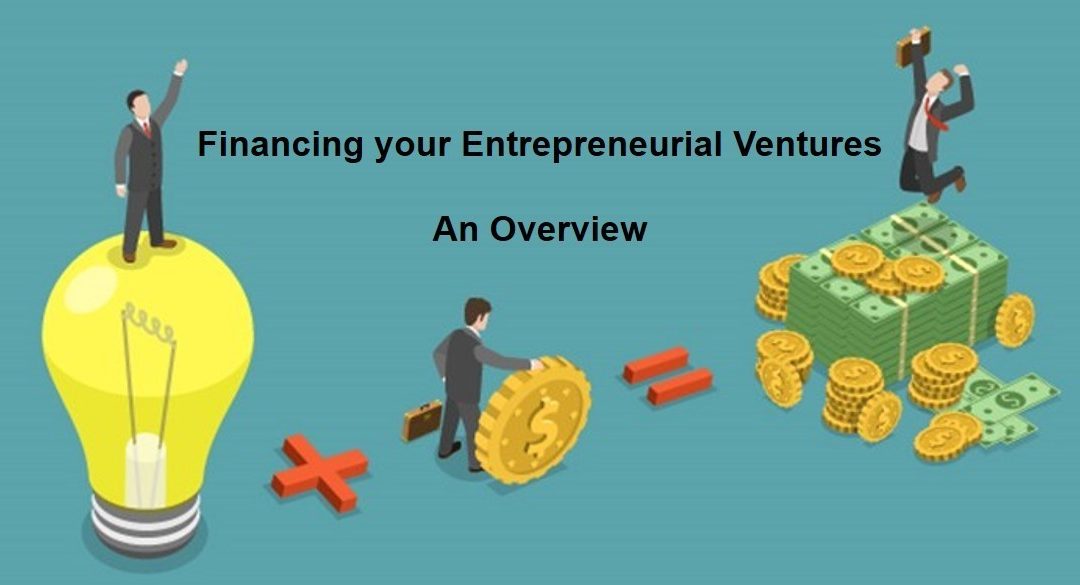Considering that Australia has a comparatively high percentage of people who are currently aspiring to start their own business over the next 5 years, this topic is highly contemporary and one much sought after.
One is correct in assuming that most successful businesses have a robust plan and thus, as a first set of action, one should put their thoughts down on paper. A Business Plan provides clarity and direction and is result of extensive research. However, that is for another day.
There’re not many business plans, however, which covers a great deal on Financing and as an adviser to small & medium enterprises (SMEs), I often come across clients who struggle to take off due to lack of funding. This blog is an attempt to clarify some key concepts and information on funding that aspiring entrepreneurs should familiarise themselves with.
 There is a variety of funding methods available to entrepreneurs. However, not every funding method is suitable or available for every business. Choosing the right mix of funding options is an important strategic decision for entrepreneurs, as it can have a major impact on the future success or otherwise of their venture.
There is a variety of funding methods available to entrepreneurs. However, not every funding method is suitable or available for every business. Choosing the right mix of funding options is an important strategic decision for entrepreneurs, as it can have a major impact on the future success or otherwise of their venture.
Using debt or equity financing; or a mixture of both – a choice to make
Clearly, debt financing and equity financing are very different from each other.
Equity financing is money invested in the venture with no legal obligation for entrepreneurs to repay the principal or to pay interest. It does, however, require sharing the ownership and profits with the funding source. Since no repayment is required, equity capital can be more secure for new ventures than debt financing. The entrepreneur, however, must consciously decide if he/ she is ready to give up part of the business.
Debt financing, on the other hand, involves a payback of the funds plus an interest for the use of the money. It places a burden of repayment and interest on the entrepreneur; and often may also need a security.
Choosing the right source of funding starts with what stage of development your business is at…
The decision about appropriate financing options depends on what stage of development the venture is in.
There are four main stages of development for entrepreneurial firms:
- Seed: the entrepreneur is discovering who their customers are, how to reach them and is developing their product to create product-market fit.
- Start-up: the entrepreneur is developing strategies to scale the business. This often involves spending a lot of cash to cover this development and is a critical stage for securing financing.
- Early growth: the entrepreneur is developing systems to grow the firm and,
- Established: the firm has grown sufficiently and now needs corporate management and financing
Sources of funding for seed stage ventures
 Many entrepreneurs think that if they can come up with a great idea, they will be able to find an investor to finance the development of the idea. That is, however, not always true. Most entrepreneurs, in reality, will need to find their initial funding elsewhere. Common sources of financing for this stage are discussed below.
Many entrepreneurs think that if they can come up with a great idea, they will be able to find an investor to finance the development of the idea. That is, however, not always true. Most entrepreneurs, in reality, will need to find their initial funding elsewhere. Common sources of financing for this stage are discussed below.
Founder’s financing
This is money out of their own pocket. As entrepreneurs, you may use to draw down on your savings, credit cards or redraw equity from housing loans to provide the capital you need.
Informal investors
Initial start-up funding may also come from friends and family. There’s also something called ‘foolhardy investors’.
 These could often be neighbours, work colleagues or even strangers from sources like Gumtree, social media or even referrals. These investors use their own money and carry out their own due diligence to invest in the entrepreneurial opportunities of entrepreneurs. This investment may be either debt funding or in exchange for an equity stake. The median expected payback time is two years and the median amount returned is often only the original investment.
These could often be neighbours, work colleagues or even strangers from sources like Gumtree, social media or even referrals. These investors use their own money and carry out their own due diligence to invest in the entrepreneurial opportunities of entrepreneurs. This investment may be either debt funding or in exchange for an equity stake. The median expected payback time is two years and the median amount returned is often only the original investment.
Peer to peer lending
 Peer to peer lending is the practice of lending to unrelated individuals without going through a traditional financial institution. This is facilitated by peer to peer lending companies who have an online platform and a system of credit checking.
Peer to peer lending is the practice of lending to unrelated individuals without going through a traditional financial institution. This is facilitated by peer to peer lending companies who have an online platform and a system of credit checking.
Australia’s most prominent company in this space is Society One. Individuals can borrow between $5000 and $50 000. Interest rates are based on Tiers and may range from around 10% to 20%.
Accelerator programs
The last decade has seen the rise of accelerator programs around the world. These programs invest in entrepreneurs in the seed stage and give them 12 to 16 weeks of intensive training and mentorship. It also comes with a small investment of $20 000 to $50 000 in exchange for 6 to 7 per cent equity in the company. However, entry into these programs is extremely time consuming and competitive. Needless to say though that the process of entry often helps entrepreneurs get much more clarity about their venture and refine where necessary.
Sources of funding for start-up stage ventures
Crowdfunding

This is by raising contributions from a large number of people, usually via an internet based crowdfunding platform such as Kickstarter.com, GoFundme or Indiegogo.com. Crowdfunding campaigns tend to work best for product-based start-ups – once the entrepreneur has completed and tested the product and is ready to start production. Those with a great network on social media often tend to get a great response from this method.
Contributors to the campaign, called ‘backers’, are given a reward for their contribution that can range from an acknowledgment to receiving the product itself or sometimes, even more, valuable rewards.
Crowdfunding can be used to raise anywhere from a few thousand dollars to hundreds of thousands or even millions for successful campaigns.
Angel investors
Angel investment is equity funding provided by high net worth individuals who generally fill the start-up financing gap between seed financing and venture capital, which is discussed later in the article.
 Business angels tend to have:
Business angels tend to have:
- domain expertise in a specific area, often science or business;
- high levels of annual income and net worth, and invest 10 to 12 percent of their capital in entrepreneurial firms;
- expect a minimum rate of return of 20 percent; and
- mostly wish to exit in three to seven years.
Business angels generally prefer to fund high-risk entrepreneurial firms in their earliest stages. They prefer to fund small amounts and are often open to investing in virtually all industry sectors.
Compared to venture capitalists, business angels tend to be more flexible in their financial decisions, and they have longer investment horizons (patient money), shorter investment processes and lower targeted rates of return. Raising funds from business angels incurs fewer fees than raising funding from financial institutions. So, certainly, this is an area where potential entrepreneurs tend to look into.
 Most business angels contribute their personal business skills to furthering young businesses as well, and therefore, usually, choose to invest locally. Business angels are more geographically dispersed than the formal venture capitalists; and the good thing is that they can be found everywhere, not just in major financial centers. Angel networks and business clusters can be found through government sources or privately managed networks.
Most business angels contribute their personal business skills to furthering young businesses as well, and therefore, usually, choose to invest locally. Business angels are more geographically dispersed than the formal venture capitalists; and the good thing is that they can be found everywhere, not just in major financial centers. Angel networks and business clusters can be found through government sources or privately managed networks.
However, this financing strategy may have some downsides as well, so, an entrepreneur needs to be vigilant:
- Firstly, business angels are less likely to make follow-on investments in the same firm. (Venture capitalists, on the other side, spend approximately two-thirds of their funds on expansion funding of their existing portfolio of firms).
- Business angels prefer to have their say in running the business, which may sometimes become challenging for the entrepreneur, especially if the angels have limited knowledge in the particular field of business.
- A small minority of business angels may turn out to be ‘devils’ who have self-serving motives for investment, rather than promoting the good of the firm.
Sources of funding for early growth stage ventures
Ventures in the early growth stage often need significantly larger amounts of money and thus, more formal financing sources come into play here.
Commercial banks
 The business may be sufficiently established at this stage to be able to access business loans and other products supplied by commercial banks. This is a debt financing option and it is always wise to take professional help from experienced mortgage brokers for this. There are options wherein entrepreneurs could opt for repayment of interests only or both, principal and interests together.
The business may be sufficiently established at this stage to be able to access business loans and other products supplied by commercial banks. This is a debt financing option and it is always wise to take professional help from experienced mortgage brokers for this. There are options wherein entrepreneurs could opt for repayment of interests only or both, principal and interests together.
Venture capital (VC)
We have already mentioned about venture capital in our previous section on Angel Investors, so what exactly is this. VC firms raise funds from sophisticated investors and then use the money to invest in early growth, high potential start-ups. VC investment is usually done in stages called rounds; more investment is released once the venture has reached certain milestones.
 Raising VC funds involves a lot of effort in building the right network and pitching to Venture Capitalists. VC’s have a very thorough due diligence process and complying with it might take even as long as 12- 14 months or sometimes more.
Raising VC funds involves a lot of effort in building the right network and pitching to Venture Capitalists. VC’s have a very thorough due diligence process and complying with it might take even as long as 12- 14 months or sometimes more.
Entrepreneurs must also be aware that this is a highly professional and technical area of financing and it is crucial for them to review carefully and ensure that they understand all of the terms and conditions documents.
Having said that, there are very few VC firms in Australia as most tend to relocate to more economically vibrant hotspots like Silicon Valley for example. The Australian Government, though, has introduced a number of programs to incentivise Australian VC to invest in domestic companies.
Sources of funding for established ventures
Funding sources for established ventures include follow on investments from VC firms, private equity, commercial banks, non-financial organisations and listing on stock exchanges.
Private equity funding

Private equity firms are investment managers. Much like VC firms, they raise a pool of funds from investors and then they use those funds to take a controlling or substantial minority shareholding in a private company. Private equity firms look to maximise their investment by using their expertise to take the business through an initial public offering (IPO), a merger or acquisition or recapitalisation.
Private equity firms usually charge a management fee from their investors for this service as well as a share of the profits earned from each fund managed.
I hope by now, you would have gathered some insight into funding options. Before I conclude this article, there’s something I’d like you to perhaps look up and especially if you are a start-up – Government assistance. There are a lot more than what is listed here but this may be a good starting point:
Government assistance for start-ups
The federal, state and territory governments in Australia do not offer grants to start a business, only to expand, develop and export.
Assistance and Suggested sources

- Grants for prototype development, feasibility studies or expert advice: AusIndustry; GrantsLINK; business.gov.au
- Business planning: business.gov.au; smallbusiness.wa.gov.au
- Business mentoring: Small Business Mentoring and Succession Program; Incubate hubs and mentors
- Investment raising: AusIndustry; business.gov.au
- Research and development (R&D) to expand product range: AusIndustry; business.gov.au
- Overseas market development: AusTrade; business.gov.au
For more information and connection with the right people who could help you with funding options, please don’t hesitate to contact melvyn@fortunaadvisors.com.au



